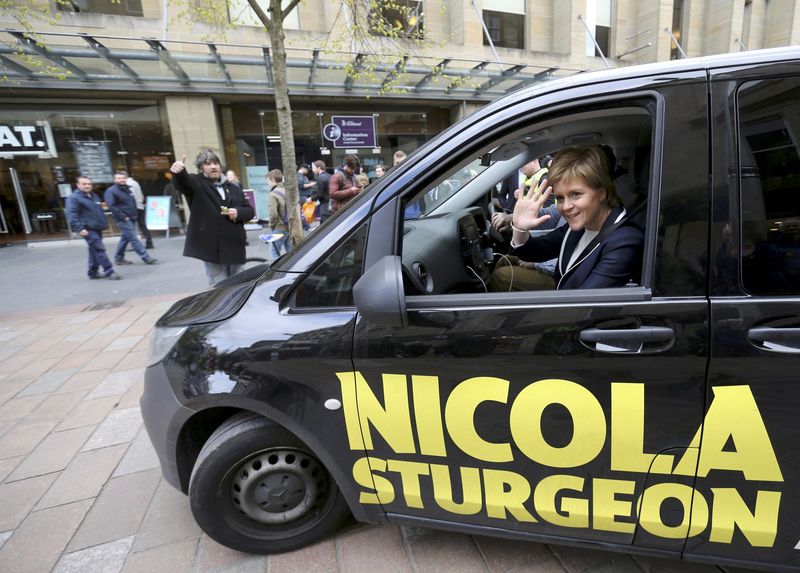Gold prices set for weekly gains on dovish Fed outlook; silver near record high
By Elisabeth O'Leary
EDINBURGH (Reuters) - Tens of thousands of Scottish nationalists are to fan out across Scotland, knocking on doors to find out if there is support for a new vote on independence that could make or break First Minister Nicola Sturgeon.
Sturgeon says she will only hold a second independence referendum when she knows it has the backing of Scottish voters, but Britain's decision to leave the EU has reshaped the political landscape and questions about Scotland's future are being asked again.
Support for EU membership among Scots in the June "Brexit" referendum was 62 percent, putting Scotland at odds with much of the rest of Britain.
The prospect of leaving the EU has disgruntled many Scots - including some of those who voted "no" to an independent Scotland two years ago because they feared independence would mean losing EU membership.
While most Scots still do not back independence, opinion polls have narrowed and another Scottish vote could prove highly disruptive as Britain grapples with its EU exit. A second no vote could prove politically fatal for Sturgeon.
Sturgeon now wants to gauge opinion on whether independence is a viable alternative again and under what terms, a person familiar with the plan told Reuters.
She will deploy her Scottish National Party's 120,000 members to ask voters door-to-door how they feel, in a project to be announced on Friday.
The SNP wants to find out why people voted against independence in 2014 and what new offer might persuade them to back it in future.
"The information we gather is another factor which will influence our next steps, alongside whether the UK government is interested in a Brexit deal which protects our status within the EU," the person said, speaking on condition of anonymity.
SNP lawmaker Richard Lochhead says the party had to measure the lie of the land after the "gamechanger" of the "Brexit" referendum to understand "what all that means for how we present the independence case and how people view it".
The EU referendum has brought some high-profile changes of allegiance. Henry McLeish, a former first minister from the Labour party, has said he is now ready to back independence.
The SNP's new drive will also buy time for Sturgeon until it becomes clear, or at least clearer, what type of EU divorce British Prime Minister Theresa May is pursuing.
Scots voted "no" to independence in 2014 by 10 percentage points, but the swell of excitement from the campaign galvanized the SNP. It now has 56 of the 59 seats allocated to Scotland in the British parliament in London.
A YouGov poll published a week after the Brexit vote however showed most Scots still backed remaining in the United Kingdom, by 53 to 47 percent.
OIL MONEY
The EU referendum result is not the only event that may have changed minds.
Scotland's yawning fiscal deficit - at 9.5 percent, more than twice that of Britain as a whole - has put into question whether it would be better off as an independent country, with a low oil price making balancing the books difficult without unpopular austerity measures which the SNP opposes.
For now, Scotland's finances are partly funded by taxpayers elsewhere in Britain.
Many opposition lawmakers say there should be no referendum at a time when the Britain is already negotiating its EU exit.
In any case, a second referendum would probably have to be agreed to by the British government, which has given no sign that it is willing to do so.
Scottish Conservative leader Ruth Davidson, from the prime minister's party, urges the SNP to get back to its "day job" of governing Scotland.
"Either we can add to the turbulence and the instability ... or we can now work to try and put this period of instability behind us so we can all focus on building a stronger and more stable country".
Some supporters say privately that Sturgeon's assessment that Brexit makes a new Scottish referendum "highly likely" could force her hand early.
"Once that idea is out there, it is very difficult to reel it back," said one senior SNP member, who requested anonymity.
Polling expert John Curtice says survey evidence is so far "certainly sufficient for the question of independence to be back on the table".
He adds, however, that post-Brexit polls are not sufficient to know what the outcome might be.
